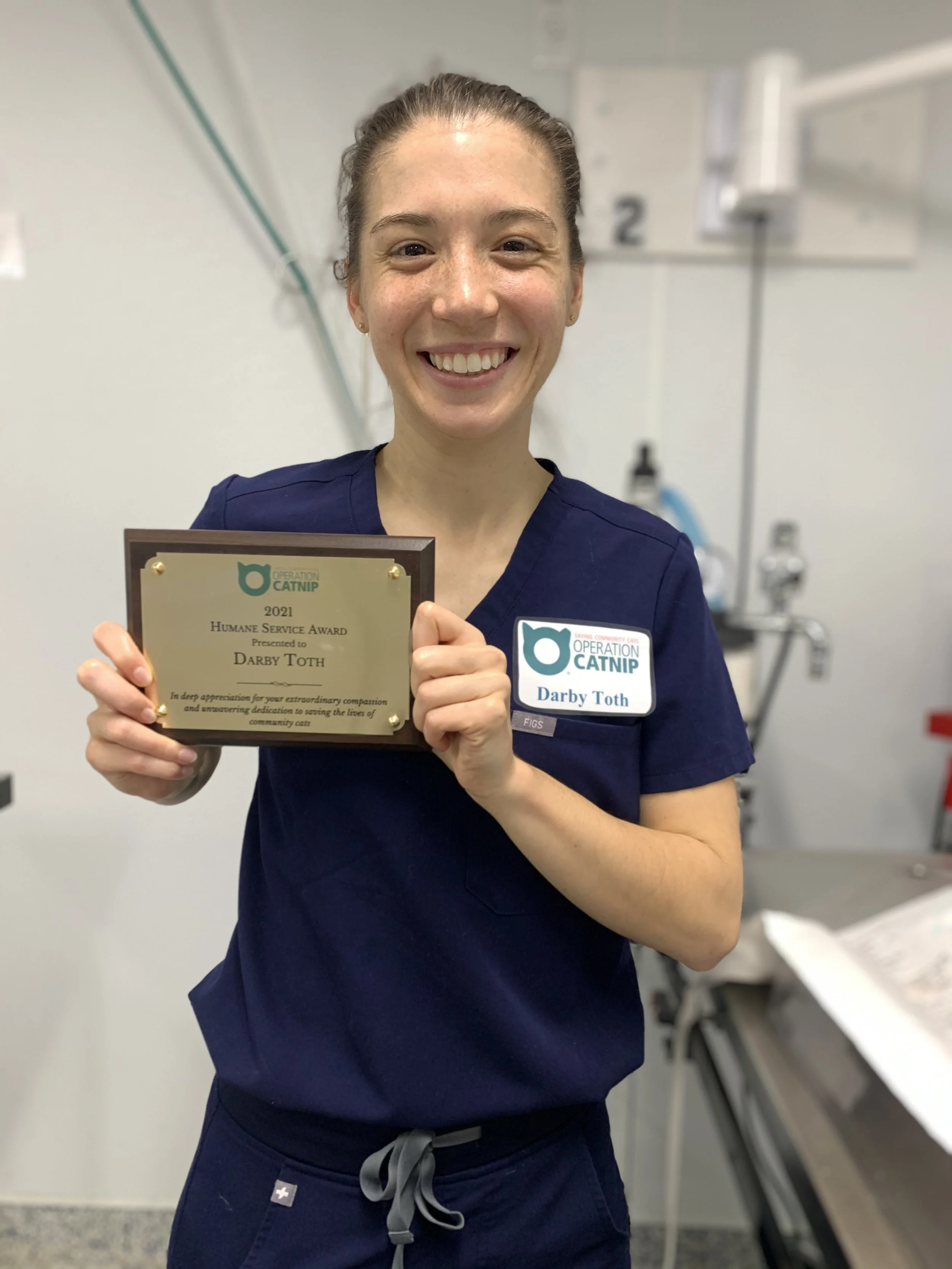Unique Veterinary Student Opportunities
Class of 2021 student Darby Toth performed over 1,500 surgical procedures during her time in vet school as an OC volunteer.
Clinic Volunteering
Veterinary students can expect a comprehensive and thorough look at HQHVSN and community cat management by participating in our program, along with opportunities to learn and hone their clinical and surgical skills. Vet students will work with our team to master skills in physical exam, surgical prep, and post-operative care, and are eligible for sugical opportunities based on satasifactory assessment of clinical techniques, engagement and involvement, and prerequisites obtained through their veterinary school education. Because of the unexpected nature of trapping cats, our clinic frequently performs special procedures such as including enucleations, amputations, hernia repairs, entropion repairs, mass removals, and more, providing vet students with even more opportunities to learn and grow. Student training is incredibly important to us, and we aim to make the OC experience educational, fulfilling, and enjoyable!
Externship program
2022 Extern Amanda Ernst completed over 100 surgeries in two weeks!
Third and Fourth year vet students are eligible to apply for 2-week structured externships, gainining hands-on experience and in-depth instruction from our skilled medical team, typically while earning course credit through their veterinary school. Externs spend their days learning the ins and outs of our HQHV spay-neuter clinic procedures, partnering on treatment plans and critical care cases, and performing sterilization procedures. With an average of 51 surgical patients per day, externs may complete anywhere from 25-100 surgeries during their 2-week rotation, depending on initial skill level.
Summer fellowship
Fellowship participants enjoy 8-10 weeks of immersion in all things related to humane community cat management. Trap loan and trapping through staging HQHVSN clinics and providing TNR for local and regional caregivers will become second nature. Working closely with Operation Catnip staff and volunteers, they will learn the intricacies of trapping cats – even those elusive kitties – and dealing with all manner of caregivers. They will learn how to set up and organize a HQHVSN clinic utilizing one skilled veterinarian caring for over 50 cats. They will manage trap inventory and various constituents utilizing several specialized software programs to keep it all nice and tidy. They will collaborate with local animal shelters to respond to community needs and to find the best outcome for every individual cat. Interested candidates will have the opportunity to gain practical clinical skills managing a multitude of feline medical and surgical cases. Fellows will participate in weekly shelter medicine rounds relevant to community cat management and present a case presentation at the end of the summer. They will leave the fellowship with the confidence to take on any project in community cat management and will have developed the skills to succeed! This is an outstanding opportunity for individuals who dreams of making significant impact in animal welfare. This Fellowship is designed for veterinary students with an interest in animal welfare and focused on lifesaving programs for community cats. Fellows will build practical skills through a blend of didactic study and hands-on clinical and field training. Students of all experience levels are welcome to apply. Opportunities to perform surgery will be dependent on each student’s experience and competency. This is a rigorous full-time position with substantial time spent outdoors in the Florida summer and a $3500-$5000 stipend, depending on length of course.
Fellowship students return cats they trapped and sterilized to their outdoor home
2020 Fellow David Graham applies a wound care treatment
2021 Fellow Rebekah Sartori posing with her enucleation patient
Wet labs
In partnership with the University of Florida’s Student Chapter of the Association of Shelter Veterinarians (SCASV), students are given the opportunity to perform their first procedures with dedicated instruction from HQHVSN surgeon coaches. After a dry lab run-through, students are paired with instructors for individualized coaching, giving them confidence and clarity as they embark on what is hopefully to be a long and successful career as skilled surgeons!
Dr. Elizabeth Fitzpatrick coaches a veterinary student through her first neuter at a Wet Lab
Wet lab participants observe Operation Catnip’s technicians prepping cats for surgery
Community Cat management course at the university of florida VEM5342
This course will use a combination of self-paced online modules and hands-on clinical training to develop the knowledge and skills necessary to effectively and humanely manage populations of unowned, free-roaming, community cats. Students will explore evidence-based strategies for mitigating the negative impacts of the country’s large population of community cats, including topics ranging from legal, environmental, and public health issues to socio-economic and animal welfare considerations. Students will join Operation Catnip for a tour and overview of our lifesaving programs, and come along on a visit to meet a caregiver of a managed cat community. The course culimates with a daylong HQHVSN clinic where students and DVM coaches perform lifesaving surgeries on 150-250 cats. After completing the course, students will be able to make a compelling case for humane community cat management programs, develop productive collaborations with local organizations and cat caregivers, organize a large-scale trap-neuter-return clinic, and perform routine feline spay and neuter surgery.
CCMC students visit local caregiver Paul and his sterilized community of cats
CCMC students tour Operation Catnip’s facility









